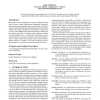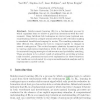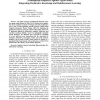325 search results - page 7 / 65 » Evolvable network architectures: what can we learn from biol... |
ISCAS
2002
IEEE
14 years 1 months ago
2002
IEEE
We have implemented an aspect of learning and memory in the nervous system using analog electronics. Using a simple synaptic circuit we realize networks with Hebbian type adaptati...
CCR
2007
13 years 8 months ago
2007
Many believe that it is impossible to resolve the challenges facing today’s Internet without rethinking the fundamental assumptions and design decisions underlying its current a...
SAB
2010
Springer
13 years 7 months ago
2010
Springer
Biological brains can adapt and learn from past experience. In neuroevolution, i.e. evolving artificial neural networks (ANNs), one way that agents controlled by ANNs can evolve t...
ECAL
2001
Springer
14 years 1 months ago
2001
Springer
Reinforcement learning (RL) is a fundamental process by which organisms learn to achieve a goal from interactions with the environment. Using Artificial Life techniques we derive ...
IAT
2010
IEEE
13 years 6 months ago
2010
IEEE
Abstract--The paper proposes a biologically-inspired cognitive agent model, known as FALCON-X, based on an integration of the Adaptive Control of Thought (ACT-R) architecture and a...



